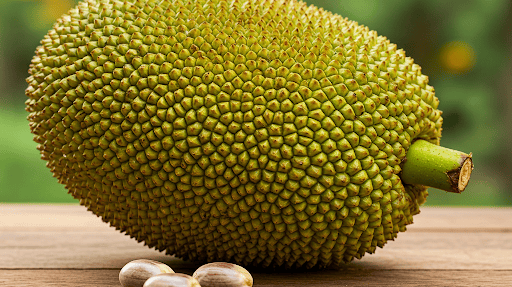Non-Profit Fiber Foods: Revolutionizing Sustainable Food Systems with Jackfruit Innovation
SUSTAINABILITYALTERNATIVE PROTEINS


This is an AI generated illustration and does not represent actual product or service.
In a world grappling with climate change, food insecurity, and the urgent need for sustainable food systems, Fiber Foods, a not-for-profit organization, is leading the charge with its work in transforming jackfruit into a versatile, sustainable, and nutritious ingredient. By developing PrimeJack®, a dehydrated jackfruit product, Fiber Foods is not only addressing global food challenges but also creating economic opportunities for smallholder farmers in East Africa, particularly women.
The Problem: Food Waste, Climate Change, and Nutritional Gaps
The global food system is under immense pressure. Climate change is disrupting agricultural practices, food waste is rampant, and the overconsumption of animal products is contributing to environmental degradation and health issues. At the same time, millions of smallholder farmers, especially women, struggle with economic instability and lack access to markets for their crops.
Jackfruit, a tropical fruit native to regions like Uganda and Kenya, is a prime example of an underutilized resource. Despite its nutritional value and versatility, jackfruit often goes to waste due to a lack of commercial demand. Fiber Foods recognized the potential of jackfruit to address these challenges and set out to create a sustainable value chain that benefits farmers, consumers, and the environment.
The Innovation: PrimeJack®
Fiber Foods’ flagship product, PrimeJack®, is a dehydrated jackfruit ingredient made from young, unripe jackfruit. The company has developed a patent-pending technology to process jackfruit into a versatile, shelf-stable product that can be used in a variety of food applications, particularly in plant-based and blended meat products.
Key Features of PrimeJack®:
1. High Fiber Content: PrimeJack® boasts an impressive 57% fiber content (8.1g per 100g when rehydrated), making it an ideal ingredient for improving the nutritional profile of food products.
2. Neutral Taste and Texture: Unlike ripe jackfruit, which has a sweet taste, young unripe jackfruit has a neutral flavor and a texture that mimics shredded meat, making it perfect for meat alternatives.
3. Sustainability: By dehydrating jackfruit, Fiber Foods reduces its volume by 90%, significantly lowering transportation emissions and making it easier to ship globally.
4. Allergen-Free: PrimeJack® is free from common allergens like soy and gluten, making it suitable for a wide range of consumers.
5. Long Shelf Life: The dehydration process ensures that PrimeJack® has a long shelf life and does not require preservatives.
The Process: From Farm to Fork
Fiber Foods has built a robust value chain for PrimeJack®, starting from smallholder farmers in Uganda and Kenya and ending with global food manufacturers. Here’s how the process works:
1. Harvesting: Young, unripe jackfruits are harvested by smallholder farmers, many of whom are women. These jackfruits are selected based on weight and quality to ensure consistency.
2. Processing: The jackfruits are peeled, cooked, and dehydrated using Fiber Foods’ proprietary technology. The process involves:
- Acid Treatment: To prevent discoloration and microbial growth, the jackfruit is treated with an acid solution during processing.
- Cooking and Drying: The jackfruit is cooked to remove its bitter taste and then dehydrated to achieve a moisture content of 3-10%.
3. Quality Control: The final product undergoes rigorous quality checks to ensure it meets standards for moisture content, rehydration ratio, and excretion value (a measure of water retention).
4. Distribution: PrimeJack® is shipped globally to food manufacturers, who use it as an ingredient in plant-based and blended meat products.
Impact: Economic, Social, and Environmental Benefits
Fiber Foods’ work goes beyond creating a sustainable food ingredient. The organization is deeply committed to creating triple value—economic, social, and environmental—for all stakeholders.
1. Economic Impact:
- Empowering Farmers: Fiber Foods provides smallholder farmers with a reliable source of income by purchasing their jackfruit. This is particularly impactful for women, who often lack access to economic opportunities.
- Job Creation: The processing facilities in Uganda and Kenya create jobs, particularly for young women, in areas where employment opportunities are scarce.
2. Social Impact:
- Gender Equality: By focusing on jackfruit, a crop traditionally managed by women, Fiber Foods is empowering women farmers and promoting gender equality in agriculture.
- Community Development: The additional income from jackfruit farming helps improve the livelihoods of farming communities, enhancing their resilience to climate change and economic shocks.
3. Environmental Impact:
- Reducing Food Waste: By commercializing jackfruit, Fiber Foods is reducing food waste and preventing the unnecessary cutting down of jackfruit trees.
- Lower Carbon Footprint: PrimeJack® has a significantly lower carbon footprint compared to animal-based proteins. A life-cycle assessment revealed that producing 1kg of rehydrated PrimeJack® emits just 0.34kg of CO2, compared to 15-30kg for beef and 5-12kg for pork.
- Sustainable Agriculture: Jackfruit trees are climate-resilient and grow year-round, providing a sustainable crop that complements other cash crops like coffee and vanilla.
Applications: Transforming the Food Industry
PrimeJack® is a game-changer for the food industry, particularly in the plant-based and blended meat sectors. Here’s how it’s being used:
1. Plant-Based Meat: PrimeJack® can make up to 70% of a plant-based meat product, providing a fibrous, meat-like texture without compromising on taste.
2. Blended Meat: By replacing 20-30% of meat with PrimeJack®, manufacturers can create healthier, more sustainable products with a better Nutri-Score. For example, a blended burger made with PrimeJack® has 1.7g of fiber and 19g of protein per serving, compared to 0g of fiber and 25g of protein in a 100% beef burger.
3. Versatility: PrimeJack®’s neutral taste allows it to absorb flavors, making it suitable for a wide range of cuisines and applications, from burgers to sausages to ready-to-eat meals.
The Future: Scaling Impact and Innovation
Fiber Foods is not stopping at jackfruit. The organization is already developing a second value chain using oysternuts, another underutilized crop. With plans to double the number of farmers in its value chain to 6,000 by 2025, Fiber Foods is committed to scaling its impact and creating more opportunities for smallholder farmers.
The company is also building a new dedicated jackfruit facility in partnership with its current production partner, further enhancing its capacity to meet growing demand. Additionally, Fiber Foods is working on achieving net-zero emissions in its operations, aligning with global sustainability goals.
Conclusion: A Model for Sustainable Food Systems
Fiber Foods Holding B.V. is a shining example of how innovation, sustainability, and social impact can come together to create a better food system. By turning underutilized jackfruit into a high-value ingredient, the organization is addressing some of the most pressing challenges of our time—climate change, food waste, and economic inequality.
With its commitment to empowering women, supporting smallholder farmers, and promoting sustainable agriculture, Fiber Foods is not just creating a product; it’s building a movement. As the world looks for solutions to feed a growing population without compromising the planet, Fiber Foods offers a blueprint for how food systems can be transformed to benefit everyone—from farm to fork.


